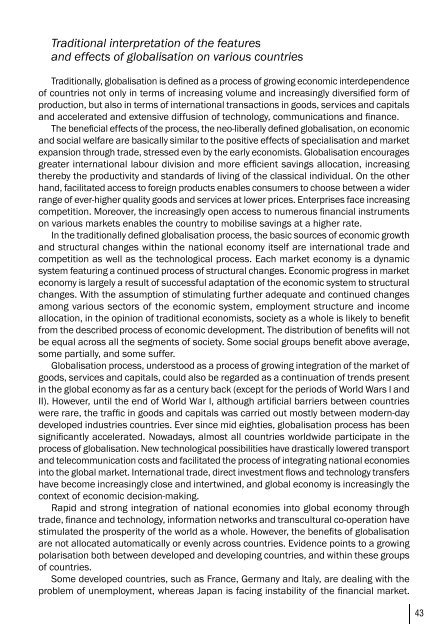art-e-conomy _ reader - marko stamenkovic
art-e-conomy _ reader - marko stamenkovic
art-e-conomy _ reader - marko stamenkovic
Create successful ePaper yourself
Turn your PDF publications into a flip-book with our unique Google optimized e-Paper software.
Traditional interpretation of the features<br />
and effects of globalisation on various countries<br />
Traditionally, globalisation is defined as a process of growing economic interdependence<br />
of countries not only in terms of increasing volume and increasingly diversified form of<br />
production, but also in terms of international transactions in goods, services and capitals<br />
and accelerated and extensive diffusion of technology, communications and finance.<br />
The beneficial effects of the process, the neo-liberally defined globalisation, on economic<br />
and social welfare are basically similar to the positive effects of specialisation and market<br />
expansion through trade, stressed even by the early economists. Globalisation encourages<br />
greater international labour division and more efficient savings allocation, increasing<br />
thereby the productivity and standards of living of the classical individual. On the other<br />
hand, facilitated access to foreign products enables consumers to choose between a wider<br />
range of ever-higher quality goods and services at lower prices. Enterprises face increasing<br />
competition. Moreover, the increasingly open access to numerous financial instruments<br />
on various markets enables the country to mobilise savings at a higher rate.<br />
In the traditionally defined globalisation process, the basic sources of economic growth<br />
and structural changes within the national e<strong>conomy</strong> itself are international trade and<br />
competition as well as the technological process. Each market e<strong>conomy</strong> is a dynamic<br />
system featuring a continued process of structural changes. Economic progress in market<br />
e<strong>conomy</strong> is largely a result of successful adaptation of the economic system to structural<br />
changes. With the assumption of stimulating further adequate and continued changes<br />
among various sectors of the economic system, employment structure and income<br />
allocation, in the opinion of traditional economists, society as a whole is likely to benefit<br />
from the described process of economic development. The distribution of benefits will not<br />
be equal across all the segments of society. Some social groups benefit above average,<br />
some p<strong>art</strong>ially, and some suffer.<br />
Globalisation process, understood as a process of growing integration of the market of<br />
goods, services and capitals, could also be regarded as a continuation of trends present<br />
in the global e<strong>conomy</strong> as far as a century back (except for the periods of World Wars I and<br />
II). However, until the end of World War I, although <strong>art</strong>ificial barriers between countries<br />
were rare, the traffic in goods and capitals was carried out mostly between modern-day<br />
developed industries countries. Ever since mid eighties, globalisation process has been<br />
significantly accelerated. Nowadays, almost all countries worldwide p<strong>art</strong>icipate in the<br />
process of globalisation. New technological possibilities have drastically lowered transport<br />
and telecommunication costs and facilitated the process of integrating national economies<br />
into the global market. International trade, direct investment flows and technology transfers<br />
have become increasingly close and intertwined, and global e<strong>conomy</strong> is increasingly the<br />
context of economic decision-making.<br />
Rapid and strong integration of national economies into global e<strong>conomy</strong> through<br />
trade, finance and technology, information networks and transcultural co-operation have<br />
stimulated the prosperity of the world as a whole. However, the benefits of globalisation<br />
are not allocated automatically or evenly across countries. Evidence points to a growing<br />
polarisation both between developed and developing countries, and within these groups<br />
of countries.<br />
Some developed countries, such as France, Germany and Italy, are dealing with the<br />
problem of unemployment, whereas Japan is facing instability of the financial market.<br />
43


